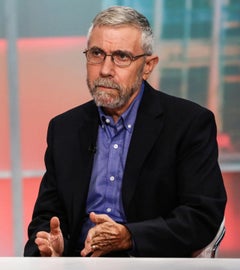MI SELECCIÓN DE NOTICIAS
Noticias personalizadas, de acuerdo a sus temas de interés

It is, indeed, kind of amazing. In the eyes of critics, Q.E. is the anti-Veg-O-Matic: It does everything bad - slicing and dicing and puréeing all good things. Quantitative easing is inflationary; well, maybe not but it undermines credibility; well, maybe not but it causes excessive risk-taking; well, maybe not but it discourages business investment (this argument, I think, is a new one).
The economist Brad DeLong spent what may be too much time dealing with this last point on his blog, citing a recent op-Wall Street Journal op-ed by the economists Kevin Warsh and Mike Spence. The pair’s argument doesn’t make any sense, and it was deployed to explain something that isn’t happening - business investment isn’t any lower than you’d expect given the relatively slow recovery. I’m not surprised to see Mr. Warsh going down this road: He’s a permahawk who used to warn about inflation, but simply changed his arguments when inflation failed to materialize. When Mr. DeLong complains that there is no coherent argument offered in the article - not a bad argument, but no argument at all - it’s pretty much what one might expect from Mr. Warsh.
Back in 2010, I reacted to one of his speeches thus: “So what we’ve got here is an assertion that bad things will happen if you do certain things, without either any evidence to that effect or any explanation of why those things should happen. Yes, maybe bond markets will punish us if we don’t slash spending right now; also, maybe we’ll have bad luck if we step on cracks, or fail to turn aside when Basement Cat crosses our path. But why does this pass for judicious policy discussion?”
What I don’t understand is why Mr. Spence wants to associate himself with this sort of thing.
But let me say, as I have before, that this whole aversion to easy money, on grounds that keep shifting and don’t seem to have much to do with any intelligible economic argument, evidently has deep roots in the conservative psyche - and it’s in the id, not the rational mind.
An Unteachable Moment
It has been almost seven years since the Fed cut interest rates to zero. The era of lowflation-plus-a-liquidity-trap now rivals in length the era of stagflation in the 1970s, and has been associated with much worse real economic performance. So where, asks Antonio Fatas, is the grand rethinking of economic theory and policy?
I asked the same question a couple of years ago. I’d add, as I did in that earlier piece, that some of us anticipated much though not all of what has gone wrong. Mr. Fatas, an economist at Insead, writes in a blog post: “But my guess is that even those who agreed with this reading of the Japanese economy would have never thought that we would see the same thing happening in other advanced economies. Most thought that this was just a unique example of incompetence among Japanese policy makers.”
Actually, though, I did write a 1999 book titled “The Return of Depression Economics,” basically warning that Japan might be a harbinger for the rest of us. True, I never expected policy to be so bad that Japan ended up looking like a role model.
The point is that by now we should have expected at least as major a rethink of economic policy as occurred in the ’70s; but in fact, we’ve seen almost no rethinking. Economists who wrote that “inflation is looming” in 2009 were warning about looming inflation five years later.
And that’s just the professional economists. As Josh Barro noted in Bloomberg in 2012, conservatives who imagine themselves to be intellectuals have increasingly turned to Austrian economics, which explicitly denies that empirical data needs to be taken into account. Although, of course, these conservatives would have claimed vindication if the inflation they were predicting had actually materialized.
Back to Mr. Fatas: How long will it take before the long stagnation of the past few years has the kind of intellectual impact that stagflation did? Indeed, how long will it be before people stop holding up the ’70s as the ultimate cautionary tale, even as we live in the midst of a continuing economic disaster that makes the ’70s look mild?
I don’t know the answer, but it’s clear that we have to understand this phenomenon in terms of politics and sociology, not logic.
La insuficiencia no es un asunto menor ni un simple desacuerdo técnico. La UPC es la base financiera del sistema de aseguramiento y su insuficiencia, además de afectar la prestación de servicios a los pacientes, afecta directamente los indicadores
Los mercados laborales son imperfectos, porque la vida es unidireccional: las decisiones del pasado son determinantes de lo que se puede hacer hacia adelante